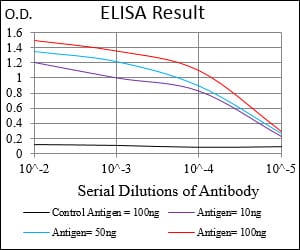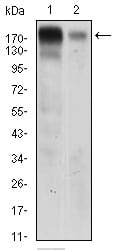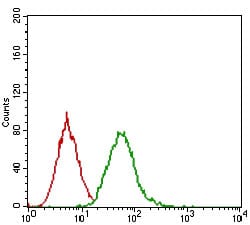



| WB | 1/500 - 1/2000 | Human,Mouse,Rat |
| IF | 咨询技术 | Human,Mouse,Rat |
| IHC | 咨询技术 | Human,Mouse,Rat |
| ICC | 技术咨询 | Human,Mouse,Rat |
| FCM | 1/200 - 1/400 | Human,Mouse,Rat |
| Elisa | 1/10000 | Human,Mouse,Rat |
| Aliases | ERBB; HER1; mENA; ERBB1; PIG61 |
| Entrez GeneID | 1956 |
| clone | 5E10D3 |
| WB Predicted band size | 175kDa |
| Host/Isotype | Mouse IgG2b |
| Antibody Type | Primary antibody |
| Storage | Store at 4°C short term. Aliquot and store at -20°C long term. Avoid freeze/thaw cycles. |
| Species Reactivity | Human,Mouse,Rat |
| Immunogen | Purified recombinant fragment of human EGFR (AA: 693-893) expressed in E. Coli. |
| Formulation | Purified antibody in PBS with 0.05% sodium azide |
+ +
以下是3篇关于EGFR抗体的经典文献,简要概括如下:
1. **文献名称**:Cetuximab for the Treatment of Colorectal Cancer
**作者**:Cunningham D, et al.
**摘要**:该研究(III期临床试验)证实西妥昔单抗(Cetuximab)联合标准化疗(FOLFOX/FOLFIRI)可显著提高转移性结直肠癌患者的客观缓解率和无进展生存期,尤其在KRAS野生型患者中效果更优。
2. **文献名称**:Panitumumab versus Cetuximab in Patients with Chemotherapy-Refractory Wild-Type KRAS Metastatic Colorectal Cancer
**作者**:Amado RG, et al.
**摘要**:研究比较了帕尼单抗(Panitumumab)与西妥昔单抗在KRAS野生型转移性结直肠癌患者中的疗效,结果显示两者总生存期和无进展生存期相似,但帕尼单抗因全人源化设计降低了过敏反应风险。
3. **文献名称**:Open-Label Phase III Trial of Panitumumab with Best Supportive Care versus BSC Alone in Patients with Chemotherapy-Refractory Metastatic Colorectal Cancer
**作者**:Van Cutsem E, et al.
**摘要**:III期试验表明,帕尼单抗单药治疗可显著延长化疗失败后转移性结直肠癌患者的无进展生存期,且KRAS野生型患者获益更明显,支持其作为精准治疗选择。
4. **文献名称**:Radiotherapy plus Cetuximab for Squamous-Cell Carcinoma of the Head and Neck
**作者**:Bonner JA, et al.
**摘要**:该研究证实,西妥昔单抗联合放疗可显著延长局部晚期头颈部鳞癌患者的总生存期,且不加重放疗毒性,成为首个EGFR抗体在头颈癌中的里程碑研究。
---
以上文献均发表于《New England Journal of Medicine》,为EGFR抗体在实体瘤治疗中的关键研究,强调KRAS/BRAF等生物标志物对疗效预测的重要性。
The epidermal growth factor receptor (EGFR) is a transmembrane tyrosine kinase receptor that plays a critical role in regulating cell proliferation, survival, differentiation, and migration. Overexpression or hyperactivation of EGFR, often due to mutations or gene amplification, is implicated in various cancers, including non-small cell lung cancer (NSCLC), colorectal cancer, and head and neck cancers. This makes EGFR a key therapeutic target in oncology.
EGFR-targeted antibodies are a class of biologic drugs designed to inhibit EGFR signaling. These include monoclonal antibodies (mAbs) such as cetuximab and panitumumab, which bind to the extracellular domain of EGFR, blocking ligand-induced activation and downstream signaling pathways like RAS/RAF/MEK/ERK and PI3K/AKT/mTOR. By doing so, they suppress tumor growth, angiogenesis, and metastasis. Cetuximab, a chimeric IgG1 antibody, also induces antibody-dependent cellular cytotoxicity (ADCC).
Clinically, EGFR antibodies are used alone or combined with chemotherapy/radiotherapy. Cetuximab is approved for metastatic colorectal cancer (wild-type KRAS) and head and neck cancers, while panitumumab targets colorectal cancer. However, resistance mechanisms, such as KRAS mutations or EGFR extracellular domain alterations, limit efficacy. Research continues to develop next-generation antibodies, bispecific constructs, and combination therapies to overcome resistance and improve outcomes. Overall, EGFR antibodies represent a cornerstone of precision oncology, exemplifying targeted therapy's potential in personalized cancer treatment.
×